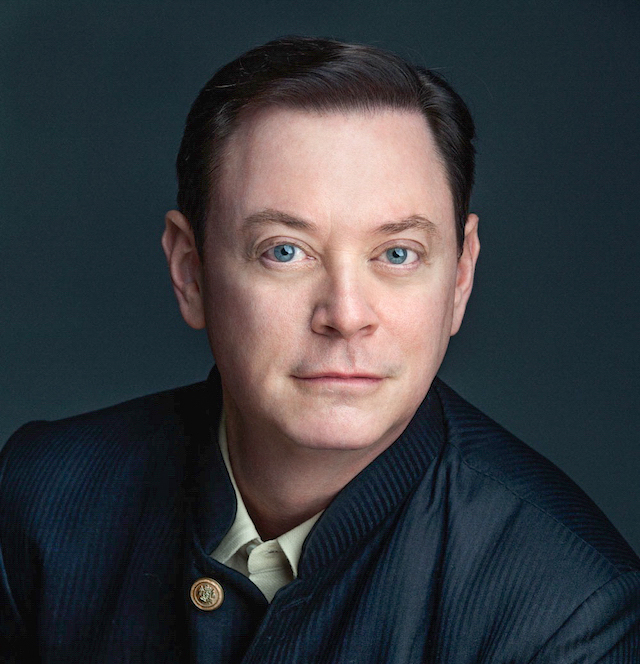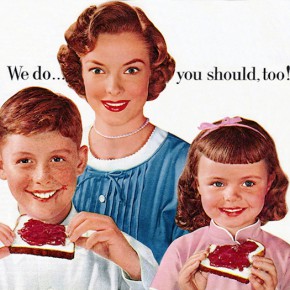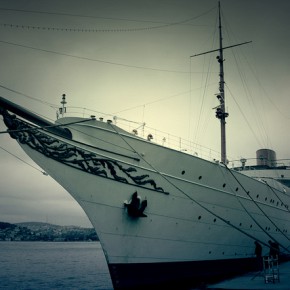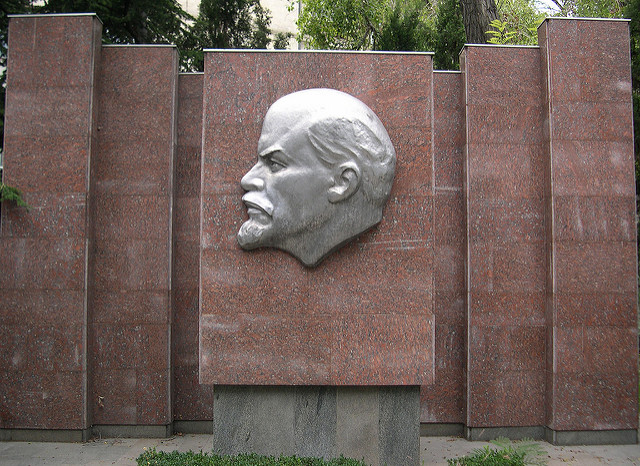One cannot help but wonder what author Andrew Solomon would have achieved had he been born into different circumstances. He sits across from me on a French-style couch in his private library, arms extended, seemingly afloat on a swell of cushions.
The room around us is all wood, gold leaf, marble and weight—a relic of the Gilded Age. Oak-paneled walls house hundreds of books, row upon row, all the way to the ceiling. The curtains, charged with covering two 18-foot windows, are so heavy that they must be held aside with chains. A glossy oil painting hangs above the mantelpiece: Madonna and child in repose.
Solomon, now 52 years old, was born in Manhattan to blue-blooded parents. His father, Howard Solomon, is the CEO of pharmaceutical manufacturer Forest Laboratories. The company introduced the world to Celexa, a highly profitable antidepressant. Andrew attended a string of elite schools—Horace Mann, Yale, and Cambridge—and is now President of the PEN American Center and a Professor of Clinical Psychology at Columbia University Medical Center.
This is not to say that Andrew Solomon is pretentious, closed off, or unaware of his privilege. Just the opposite. He’s written extensively about mental health issues ranging from depression to autism, and been an advocate for LGBT rights and an ambassador of deaf culture. His most recent book, Far from the Tree: Parents, Children, and the Search for Identity, won the National Book Critics Circle Award for nonfiction in 2012. In late April, he’ll release Far and Away: Reporting from the Brink of Change, an anthology of his reporting from places in the midst of social, political and spiritual upheaval.
Solomon’s voice contains traces of a British accent. It has a strange, metallic resonance—almost as though experience has hollowed it out, or made the space inside of him bigger. He tends toward monologue, but that tendency doesn’t feel rude. When Solomon speaks, his focus turns inward; his words seem like efforts at personal cartography as well as communication. Watching Solomon in his three piece suit and red satin tie, I found myself guessing at the terrain between us.
As a child, Andrew Solomon was anxious and shy, with an imagination that far outpaced his willingness to explore. He was adventurous only in terms of his palate, relishing in exotic foods. When Solomon was twelve, his mother warned him that he might be missing out by playing things so safe. “Being an adventurous eater is not the same as being an adventurous person,” she said.
Carolyn Bower Solomon loved travel. She planned excursions to coincide with her husband’s business trips abroad, and encouraged her son to read about local histories, foods and sights before visiting them. In part due to Carolyn’s urging, Andrew started incorporating purposeful encounters with difference into his adult life. Many of those encounters became articles in Travel and Leisure, The New York Times Magazine, Harpers & Queen, New Republic and Esquire.
Solomon’s first major foray into international reporting came in 1988 when he was assigned to cover Sotheby’s first sale of contemporary Russian art in Moscow. The scene was a mishmash of motivations and money as western art buyers capitalized on the Soviets’ new policy of glasnost, or ‘openness.’ A vanguard of avant-garde artists watched as their work, heavy with political subterfuge and tied to a nearly indecipherable Soviet context, was sold at exorbitant prices. Eager westerners, unaware of the art’s meaning, purchased it as souvenirs. The values ascribed by the bidders were the inverse of what the artists believed appropriate; the most revolutionary artworks sold for a relative pittance, while the least transgressive ones raked in cash. Regardless, all of the artists catapulted from poverty to wealth, from obscurity to international renown, overnight.
Solomon chronicled this moment of cultural clash in The Winter Palettes, originally published in Harpers & Queen. He became friends with many within the Russian avant-garde, and bore witness as they resisted the 1991 coup, an event whose failure destabilized the Soviet Union.
“I don’t want to say that I stood at the crossroads of history and, if it weren’t for me, the Cold War wouldn’t have ended or anything,” Solomon tells me. “I haven’t affected it at the level at which great statesmen have affected it, but I think just by chronicling it, just by being there, you have some sort of tiny little bit of an effect—sometimes—on the way people feel.”
Since that time, Solomon has continued to explore the globe. Far and Away features dispatches from just about everywhere, including twenty three countries and all seven continents. He tours readers through trauma-wracked Cambodia, where a group of women use storytelling to forget the Khmer Rouge. He visits Rwanda to speak with “the children of bad memories,” those conceived by rape during the genocide. He also covers the shifting dynamics between Rio de Janeiro’s privileged classes and the impoverished favelas.
Solomon argues, somewhat self-consciously, for the diplomatic value of art and cross-cultural awareness. With every argument, you can locate places where idealism has receded and pragmatism has flooded in. He is involved with the Writers in Prison Committee of PEN International, which works to support imprisoned journalists and writers. It makes recommendations on individual cases and supports broader initiatives related to freedom of expression.
“There’s been discussion at various stages within PEN about whether we should focus on writers we have some reasonable chance of having freed or whether we should continue to give the award to writers, who, for example, were imprisoned by the Chinese government. That government does not, in general, respond to this kind of thing or take any kind of visible interest in it at all,” Solomon explains. He then went on summarize letters he’d received from jailed recipients of the award, as well as some who were eventually freed.
“They said, ‘Even if I wasn’t going to be freed in the first place, the fact that there was international attention, even in places like China, meant that we were treated a little more carefully in prison.’ It was not suddenly turned into a country club, but they were treated more carefully. But they also said, ‘It gave us such a feeling of hope to think that people thousands of miles away in another society actually cared about what happened to us, and we derived enormous strength from that.’”
“Now I’m not going around giving awards in my capacity as a writer, but I think just showing up a lot of the time is meaningful to people in far-flung places,” Solomon continues. “Just establishing that everyone in the United States isn’t Donald Trump.”
Solomon seems at a loss to describe the current political climate in the United States. Trump’s rise has unseated him both intellectually and emotionally, revealing a kind of blind spot.
He stares ahead and furrows his brow, as if trying to untie an invisible knot. “It’s not that I just disagree with him, it’s that I don’t understand how it is that so many people come to agree with him. I’m left completely bewildered by it. I feel like kind of a moron.” His eyes widen. “I didn’t really think it could happen, but I have older German friends whom I’ve talked to who’ve said, ‘We thought Hitler was ridiculous. We never thought that he was going to come to anything.’ I’m not saying that Trump is really Hitlerian, but I feel that the social fabric is very thin.”
Still, Solomon understands that the current political climate might well appreciate his upcoming book. “Of course, I couldn’t know when I was working on the anthology that it would end up coming out in this election season and that this election would be so focused around xenophobia and a rejection of the globe. Or at least, an argument about rejecting the globe.”
Solomon is troubled by the creation of impermeable borders—even abstract ones. We spoke about the state of identity politics, and what it means to define oneself.
“I think the phrase ‘identity politics’ has come to be associated with a tendency for groups to define themselves in separation from other groups in ways that I often think are counterproductive. I remember being in college and hearing someone say, ‘What could I as a black lesbian possibly learn from J.S. Mill?’ I mean, I don’t find J.S. Mill particularly electrifying, but I feel like the whole point of figuring out who you are is then to be constantly open to the ways in which other people are, and to grow through those encounters with difference.”
“The question of identity, on the other hand, is really important. How do you define your identity? How do you determine with whom else you can share concerns or values or points of view? And how do you, by defining something as an identity, defend yourself against prejudice, against racism, against homophobia, against Islamophobia or anti-Semitism, and all of those other assaults? I don’t like the exclusionary aspects of identity, but I do like the ways in which it reifies confidence for people who might otherwise find that certainty elusive.”
Though identity creation and empathy go hand in hand, there seems to be an upper limit on the latter. It’s a point at which we cease to understand; the tools we use for self-reflection suddenly seem useless when applied to an altogether different machine. Andrew Solomon is one of the most empathetic human beings I’ve ever encountered. But under certain circumstances, even he crosses into the dark terrain of incomprehension. That terrain is home to human violence, and it forbids cartography.
“I don’t understand how people can treat one another with complete cruelty, and not themselves be devastated by it,” Solomon tells me heavily. His eyes angle down toward the coffee table in front of him. I can see that he’s mentally revisiting some other, foreign place. As it turns out, that place is 1990s Rwanda.
“How can you be part of the Interahamwe?” he asks rhetorically, referring to the Hutu paramilitary organization that systematically murdered the Tutsi population. (Interahamwe translates to “Those Who Work Together”).
“It’s not that I feel that I wouldn’t do it because I have some high moral principle that it’s wrong,” he continues, somewhat to my surprise. “I wouldn’t do it because chopping people up with a machete would be upsetting and horrible for me. I don’t understand how there can be so many people who don’t find that upsetting. I know that sounds kind of naïve, but it’s been a shocking thing in facing the violence of these places. I understand people who steal things, I understand people who enrich themselves at the expense of others, but there’s a level at which it becomes incomprehensible.”
One might argue that this incomprehensibility is the result of a steep privilege gradient. Most of us struggle to wrap our minds around such brutal actions—and count ourselves lucky for it.
But what counts as a privilege in one circumstance might be a disadvantage in another.
Such is often the case with art-making. Solomon opens Far and Away with an aphoristic statement about recording his travels: “At first, I liked having had adventures better than I liked having them, but bit by bit, I realized that either you have a good time, or you have a story to tell.” While this may seem lighthearted and playful, it hints at a deeper philosophy. In the creation of meaningful art, an element of suffering is required.
Solomon’s international reporting often analyzes artistic responses to political change. Though Solomon may not always envy the sociopolitical realities of the places he’s reported on, he envies the immediacy of purpose borne by them. He believes that visionary creativity occurs when people are forced to step outside of themselves, to see beyond individual ambitions.
He recalls the story of Phaly Nuon, a Cambodian woman who survived the Khmer Rouge’s death squads. Her experiences feature prominently in Far and Away. In the wake of her trauma, Nuon devised a plan for treating depression in her fellow female survivors, many of whom had witnessed inhuman atrocities. The plan was simple and, by Solomon’s description, “curiously organic.” She taught the women three skills—forgetting, working, and loving. But she managed to do it with the use of available tools: fingernail polish, television, music, the power of words.
Of Nuon, Solomon explains, “It’s not that she was able to come up with a treatment plan despite circumstances of great deprivation. She came up with what she came up with because of those circumstances of deprivation. If she hadn’t been deprived in the way she was, she would have used Prozac or psychoanalysis or some other method that’s available and proven. It was the adversity that forced her into that originality. We often assume that we have freedom and all these poor people are oppressed. And I don’t, by any means, want to discount how difficult their lives are and, you know, how relatively easy our lives are. But sometimes that oppression forces people toward a kind of freedom that is unknown to us as we plod along, more or less in tune with the society we’re living in.”
Andrew Solomon portrait courtesy of Timothy Greenfield-Sanders. All rights reserved.





